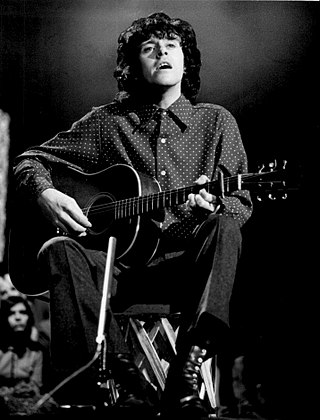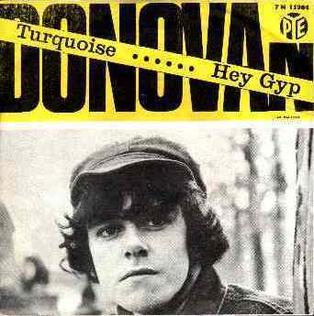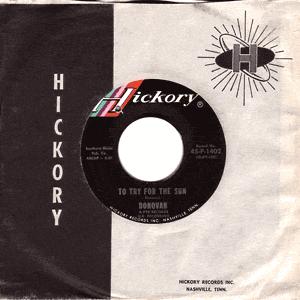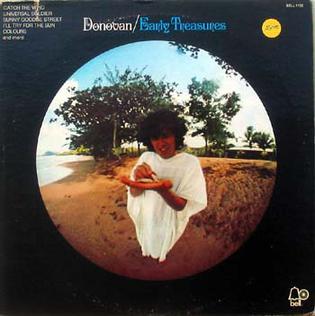
Donovan Phillips Leitch, known mononymously as Donovan, is a Scottish musician, songwriter and record producer. He emerged from the British folk scene in early 1965, and subsequently scored multiple international hit singles and albums during the late 1960s. His work became emblematic of the flower power era with its blend of folk, pop, psychedelica, and jazz stylings.

What's Bin Did and What's Bin Hid is the debut album from Scottish singer-songwriter Donovan. It was released in the UK four days after his nineteenth birthday on 14 May 1965, through Pye Records. Terry Kennedy, Peter Eden, and Geoff Stephens produced the album. The album was released in the US as Catch the Wind on Hickory Records in June 1965. Hickory Records changed the title to match that of Donovan's debut single.

Fairytale is the second album from Scottish singer-songwriter Donovan. It was first released in the UK on 22 October 1965 through Pye Records. The US version of Fairytale was released by Hickory Records in November 1965 with a slightly different set of songs. Peter Eden, Geoff Stephens and Terry Kennedy produced the original album.
"Universal Soldier" is a song written by singer-songwriter Buffy Sainte-Marie. The first released recording was a single by The Highwaymen, released in September 1963. The song was also released on Sainte-Marie's debut album It's My Way!, released in April 1964. "Universal Soldier" was not an immediate popular hit at the time of its release, but it did garner attention within the contemporary folk music community. It became a hit a year later when Donovan covered it, as did Glen Campbell. Sainte-Marie said of the song: "I wrote 'Universal Soldier' in the basement of The Purple Onion coffee house in Toronto in the early sixties. It's about individual responsibility for war and how the old feudal thinking kills us all." The idea was based on that politicians, with power over the military, in democratic states are elected by the people.

The Real Donovan is the first compilation album from Scottish singer-songwriter Donovan. It was released in the US in September 1966.

"Catch the Wind" is a song written and recorded by Scottish singer-songwriter Donovan. Pye Records released "Catch the Wind" backed with "Why Do You Treat Me Like You Do?" as Donovan's debut release in the United Kingdom on 28 February 1965. The single reached No. 4 in the United Kingdom singles chart. Hickory Records released the single in the United States in April 1965, where it reached No. 23 in the United States Billboard Hot 100.

"Turquoise" is a song written and recorded by British singer-songwriter Donovan. The "Turquoise" single was released in the United Kingdom on 30 October 1965 through Pye Records and charted, peaking at No.30. The "Turquoise" single was backed with "Hey Gyp " and only released in the United Kingdom. "Turquoise" was released as the b-side on "To Try for the Sun" in the United States.

"To Try for the Sun" is a song written and recorded by Scottish singer-songwriter Donovan. The "To Try for the Sun" single was backed with "Turquoise" and released in the United States in January 1966 through Hickory Records.

"Josie" is a song written and recorded by British singer-songwriter Donovan.
"Remember the Alamo" is a song written by Texan folk singer and songwriter Jane Bowers. Bowers details the last days of 180 soldiers during the Battle of the Alamo and names several famous figures who fought at the Alamo, including Mexican general Santa Anna and Texans: Jim Bowie, William Barrett Travis and Davy Crockett. It champions the Texans' efforts against Mexico to establish an independent republic.

Like It Is, Was, and Evermore Shall Be is a compilation album from Scottish singer-songwriter Donovan. It was released in the US in April 1968. Like It Is, Was, and Evermore Shall Be marked the second Hickory Records compilation of Donovan's 1965 Pye Records material in the United States, following the moderately successful The Real Donovan from 1966.

Early Treasures is a compilation album from Scottish singer-songwriter Donovan. It was released in the United States in 1973.

The Best of Donovan is a compilation album from Scottish singer-songwriter Donovan. It was released in the US in November 1969. The Best of Donovan marked the third Hickory Records compilation of Donovan's 1965 Pye Records material in the United States, following the Like It Is, Was, and Evermore Shall Be from 1968.

Summer Day Reflection Songs is a compilation album from Scottish singer-songwriter Donovan. It was released on 25 April 2000.

Hickory Records is an American record label founded in 1954 by Acuff-Rose Music, which operated the label up to 1979. Sony Music Publishing revived the label in 2007. Originally based in Nashville, and functioning as an independent label throughout its history, it has had several distributors.

"Sunshine on My Shoulders" is a song recorded and co-written by American singer-songwriter John Denver. It was originally released as an album track on 1971's Poems, Prayers & Promises and later, as a single in 1973. It went to No. 1 on the Billboard Hot 100 chart in the U.S. in early 1974.

"Love Potion No. 9" is a song written in 1959 by Jerry Leiber and Mike Stoller. It was originally performed by the Clovers, who took it to No. 23 on the US as well as R&B charts that year. It reached #20 in Canada.

This is the discography of Scottish singer, songwriter and guitarist Donovan.
"Jennifer Juniper" is a song and single by the Scottish singer-songwriter Donovan, released in 1968. It peaked at number 5 in the UK Singles Chart, and at number 26 in the Billboard Hot 100. AllMusic journalist Matthew Greenwald noted that "capturing all of the innocence of the era perfectly, it's one of his finest singles".
"Hey Gyp (Dig the Slowness)" is a song by Donovan. He based it on "Can I Do It For You", a song by Memphis Minnie and Kansas Joe McCoy. The name "Gyp" refers to Donovan's best friend, Gyp Mills, known then as Gypsy Dave, and is one of many songs that Donovan wrote and recorded as a dedication to his close friends.

















